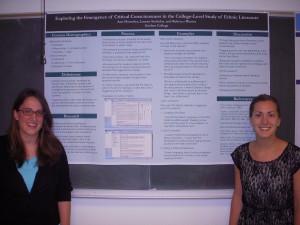Maple Scholars focus on Latino and Mennonite lit
Reflections on a summer of research
This summer, under the direction of English professor Ann Hostetler, I spent eight weeks working on a Maple Scholars project about the effect of college-level ethnic literature courses on student thinking. The project focused on two classes Ann recently taught at Goshen: Mennonite Literature (spring 2011) and Latino Literature (spring 2012). Rebecca Weaver, another Goshen student, focused on the Latino Literature class, while I focused on the Mennonite Literature class.

The students in Mennonite Literature were each required to keep a blog related to the course, and the bulk of my summer work involved reading and analyzing these blogs. After going through all of the blog posts, I sorted student thoughts into different categories, using the software program NVivo to organize the data. An end goal of my analysis was to find ways that students’ self-perceptions and worldviews had been affected by taking the course, in particular looking at how this differed for Mennonite and non-Mennonite students. I also looked for triggering points—particular sections of text, class discussions, and other materials that spurred changes in thought for a student.
I had never worked with qualitative data before this summer and knew little about pedagogy, so I enjoyed delving into these new areas for this project. One challenge of qualitative research, as I quickly discovered, is that it is often “messy.” Even when I found a great example of a student gaining new understanding, it didn’t always fit neatly into one of the categories I had defined, nor was it simple to create categories that were relevant to the writing of all eight students. In spite of these initial frustrations, I was able to organize all of the data and began to draw a few conclusions from it. I found that, in order to have a change in their personal thinking, students needed not only to understand and analyze the class texts but also to relate them to personal experience. These connections were typically more natural for Mennonite students, who more easily related to cultural references in the literature, but non-Mennonite students found other ways to connect.
While I was given a beneficial amount of autonomy to work and make decisions, I was not completely on my own. Ann, Becca, and I met often to evaluate the direction of the project, and we talked with Aliah Carolan-Silva and Kim Case from CITL about the best ways to apply the NVivo software. Another communal aspect of the summer that I enjoyed was the Friday symposium, where each week students and professors reported on the progress of their projects. I loved hearing about such a wide range of topics, from the circadian rhythm in two species of bees to the ways piano teachers can include creativity in their curriculums to the function of professors as faith mentors.
As I analyzed how the Mennonite Literature course had impacted both the Mennonite and non-Mennonite students’ concepts of themselves and the world, I was also compelled to consider how studying the course had changed and challenged me. One non-Mennonite student stated in her blog that she sometimes felt alienated and like her non-pacifist opinion didn’t matter because no one else in the class agreed with her. This and other comments made me more fully realize my privilege as an ethnic Mennonite student at a Mennonite college, where my views seem fairly similar to those of most people I interact with. This is just one of the insights from my Maple Scholars summer that I’ll carry with me during my senior year at Goshen.
Lauren Stoltzfus is a senior English Writing major.




